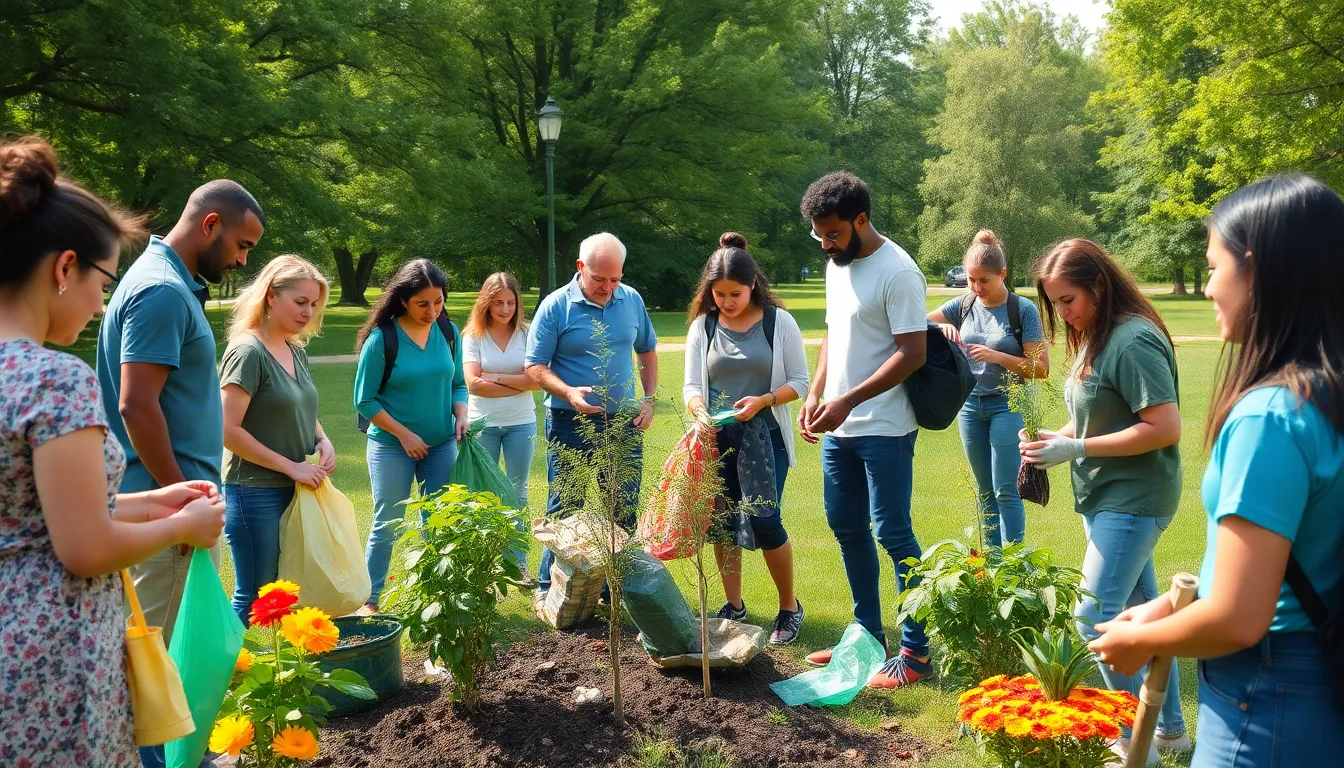In a world where plastic seems to outnumber people and climate change is the new buzzword, sustainable living isn’t just a trendy hashtag; it’s a necessity. Imagine a life where your morning coffee doesn’t come with a side of guilt, and your eco-friendly choices help save the planet instead of contributing to its demise. Sounds dreamy, right?
Table of Contents
ToggleUnderstanding Sustainable Living
Sustainable living involves making choices that reduce an individual’s or society’s environmental impact. This lifestyle focuses on conserving resources, minimizing waste, and fostering ecological balance. Individuals can achieve this by adopting practices that promote sustainability in various aspects of life.
Practices like reducing plastic usage, recycling materials, and using energy-efficient appliances contribute directly to a healthier planet. For example, opting for reusable bags and containers limits the influx of plastic waste into ecosystems. Each choice made can result in significant environmental benefits.
Innovative ideas also play a vital role in sustainable living. Alternatives like plant-based diets and local sourcing enhance food security while lowering carbon footprints. These changes positively influence local economies and reduce transportation emissions.
Time spent understanding sustainable options pays off in the long run. Each effort, no matter how small, contributes to addressing climate change and preserving natural resources for future generations. Educational initiatives increase awareness about sustainability and empower individuals to take meaningful action.
Cost-effective measures come into play when discussing sustainable living. Investing in renewable energy sources, such as solar panels, leads to long-term savings and reduces reliance on fossil fuels. Long-term investments in sustainable technologies can assist in combating environmental challenges.
Communities benefit significantly from collective sustainable practices. Collaborating on local initiatives, such as community gardens or clean-up events, fosters a sense of responsibility and belonging. These activities not only enhance local environments but also strengthen community ties.
Embracing sustainable living creates a ripple effect, inspiring others to connect and engage in eco-friendly practices. It’s a lifestyle choice that paves the way for a healthier planet and fosters a sense of stewardship among individuals.
Environmental Impact

Sustainable living significantly influences the environment, addressing critical issues like climate change and resource depletion.
Reducing Carbon Footprint
Reducing carbon footprints plays a key role in combating climate change. Individuals can lower emissions by using public transportation, biking, or walking instead of driving. Switching to renewable energy sources, such as solar or wind power, also contributes to lowering greenhouse gas emissions. Opting for energy-efficient appliances reduces energy consumption substantially. Choosing plant-based diets decreases the carbon footprint associated with food production, as livestock farming generates high levels of emissions. Collectively, these actions support efforts to stabilize global temperatures and promote healthier ecosystems.
Conserving Natural Resources
Conserving natural resources is vital for sustaining the planet’s health. Implementing practices like recycling and composting minimizes waste in landfills. Using water-saving fixtures and rainwater collection systems helps manage water resources efficiently. Supporting local agriculture reduces transportation requirements, preserving energy and decreasing reliance on non-renewable resources. Additionally, prioritizing sustainable forestry ensures that wood and paper products are sourced responsibly. Embracing these actions fosters ecological balance and ensures that resources remain available for future generations.
Economic Benefits
Sustainable living presents numerous economic benefits that directly impact individuals and communities. Implementing eco-friendly practices not only promotes environmental health but also supports financial stability.
Cost Savings
Cost savings often accompany sustainable lifestyle choices. Reducing energy consumption through energy-efficient appliances and home insulation results in lower utility bills. Adopting a plant-based diet can decrease grocery expenses by focusing on affordable, seasonal produce. Utilizing public transportation or biking instead of driving cuts fuel costs significantly. Moreover, homeowners who invest in solar panels may see reduced electricity costs over time, offering long-term savings.
Supporting Local Economies
Supporting local economies becomes easier through sustainable living. Purchasing products from local farmers and artisans keeps money within the community. Choosing to shop at farmer’s markets promotes regional agriculture and cultivates strong local ties. Small businesses thrive when residents prioritize local goods over imports. Strengthened communities enhance economic resilience and create job opportunities, enriching local environments. By fostering these relationships, individuals contribute to economic sustainability while enjoying fresh, high-quality products.
Social Responsibility
Social responsibility plays a vital role in sustainable living. Individuals engaging in eco-friendly practices create positive impacts on communities while promoting a healthier planet.
Healthier Communities
Healthier communities emerge from sustainable practices. Green spaces, such as parks and community gardens, contribute to improved air quality and mental well-being. Reduced waste from recycling initiatives enhances local environments. Sustainable transportation options, like biking and walking, foster physical fitness and connectivity among residents. Each effort promotes inclusivity by bringing people together for shared goals. Overall, embracing sustainable living leads to vibrant, resilient communities that thrive.
Ethical Consumerism
Ethical consumerism shapes the way individuals approach purchases. Making informed choices supports businesses that prioritize sustainability and social responsibility. Fair-trade products ensure equitable treatment of workers while minimizing environmental impact. Locally sourced goods strengthen local economies and reduce carbon footprints through shorter transportation routes. With every purchase, consumers can drive change by supporting brands committed to ethical practices. Ultimately, cultivating a culture of ethical consumerism empowers individuals to contribute to broader social responsibility efforts in their communities.
Making Sustainability Accessible
Making sustainable choices easier enhances the likelihood of adoption. Individuals can implement small changes that make a significant difference over time.
Tips for Everyday Living
Choose reusable bags when shopping to reduce plastic waste. Opt for a refillable water bottle instead of single-use plastic bottles. Embrace energy-efficient appliances to decrease utility costs while conserving power. Incorporate plant-based meals throughout the week, leading to lower carbon footprints. Practice composting food scraps, enriching soil while minimizing landfill contribution. Prioritize public transportation to reduce individual carbon emissions and promote healthier commute alternatives.
Community Involvement
Participate in local clean-up events to foster community engagement and promote environmental stewardship. Join community gardens to connect with neighbors while cultivating fresh produce. Advocate for greener policies at town hall meetings to influence local sustainability initiatives. Collaborate with local businesses that share eco-friendly goals, supporting a stronger local economy. Volunteer for organizations focused on environmental conservation, strengthening bonds while working toward common objectives. Engaging in community efforts amplifies the impact of individual actions, leading to significant progress in promoting sustainable living.
Sustainable living is essential for fostering a healthier planet and thriving communities. By making conscious choices, individuals can significantly reduce their environmental impact while enjoying economic benefits. Each small action contributes to a larger movement that inspires others to embrace eco-friendly practices.
As people engage in sustainable habits, they not only improve their own quality of life but also strengthen community bonds. This collective effort creates a ripple effect that promotes awareness and responsibility. Ultimately, prioritizing sustainability paves the way for a brighter future, ensuring that resources remain available for generations to come.




